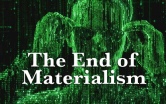



 NEXT
NEXT
 BACK
BACK
 Forum
Forum


Philosophical musings on Quanta & Qualia; Materialism & Spiritualism; Science & Religion; Pragmatism & Idealism, etc.




Does quantum physics debunk materialism?
Post 27. 04/01/2018
Quantum Idealism
Reality is an idea
The Enformationism thesis is based on a special kind of Idealistic worldview. This is not the old-
From the very beginning of philosophical speculation, there has been a tussle between sensable physical Materialism, and the speculative metaphysical notion of Idealism. Ancient Hindus, Greeks, and Neoplatonists presented Panentheistic worldviews based on the assumption of universal conscious-
Modern Quantum science and Neuroscience have reluctantly come to agree with Idealism that the wooden table you see & touch is ultimately made of stuff that is invisible (energy) and intangible (space). Quantum technologies have shown that, if you were to zoom-
Thus, it seems that our physical Reality is only apparent on the macro scale of human senses. When our technologies allow us to "see" into the micro-
Post 27 continued . . . click Next
Refutation of Idealism :
Argumentum ad Lapidarium : The name of this fallacy is derived from a famous incident in which Dr. Samuel Johnson claimed to disprove Bishop Berkeley's immaterialist philosophy (that there are no material objects, only minds and ideas in those minds) by kicking a large stone and asserting, "I refute it thus." This action, which is said to fail to prove the existence of the stone outside the ideas formed by perception, is said to fail to contradict Berkeley's argument . . .
https://en.wikipedia.org/wiki/Appeal_to_the_stone

• Quantum Idealism:
A paradox free interpretation of quantum mechanics is given using the philosophy of monistic idealism.
https://janszafranski.wordpress.com/2015/08/05/the-
• Quantum Field :
Not an actual place in space, but an imaginary theoretical “framework” to allow physicists to understand ghostly things they can’t see.
https://en.wikipedia.org/wiki/Quantum_field_theory
• Panentheism :
All in God; our world exists as an idea within the mind of God.
• Panpsychism :
All is mind; reality is an idea in the mind of God.
Note :
Quantum objects cannot be seen directly, but only inferred from their reactions to our probes. In that sense, they are imaginary.